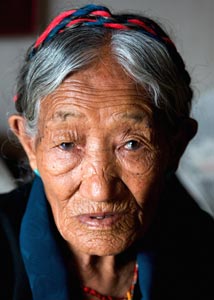Name: Nangpa Kyipa
(Alias: No)
Gender: Female
Interview Age: 86
Date of Birth: 1921
Birthplace: Phari Khambu, Utsang, Tibet
Year Left Tibet: 1959
Profession: Agriculture, Dairy Farming
Monk/Nun: No
Political Prisoner: No

Interview No.: 43
Date: 2007-06-25
Language: Tibetan
Location: Lugsung Samdupling Settlement, Bylakuppe, Karnataka, India
Categories: Oppression and Imprisonment
Keywords: Bylakuppe -- early life in , Chinese -- oppression under, Chinese rule -- life under, forced labor, imprisonment, refugee in India -- life as, trade, Utsang
Summary:
Nangpa Kyipa grew up near Phari in a place where abundant hot springs cured illnesses. Her family members were farmers and there was plenty of food to eat. With hundreds of cattle, they had enough butter and cheese to trade in nearby Bhutan for bags of rice.
Nangpa Kyipa recalls the Chinese telling the villagers that they would eradicate poverty by taking from the rich and giving it to the poor. She was told to give away half of her possessions. Her husband and brother were imprisoned by the Chinese. They were educated and the people from the village looked up to them so they were falsely accused of having ill-treated the villagers. Both were subjected to hard labor and many prisoners died from starvation.
Nangpa Kyipa's husband was fortunate enough to escape, but her brother remained imprisoned for years. Nangpa Kyipa then recounts her early days in Bylakuppe, India, and how they built the settlement to its present status. About Tibet, she says, "I can see the snow capped mountains. It's okay to even die on the mountain pass if I could see Tibet from there. My heart will feel that I am in Tibet."
Interview Team:
- Martin Newman (Interviewer)
- Lhakpa Tsering (Interpreter)
- Tsewang Dorjee (Videographer)

